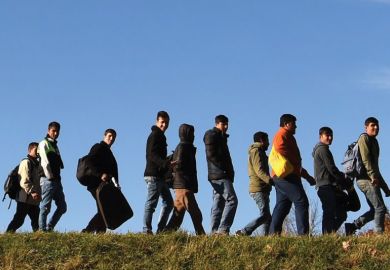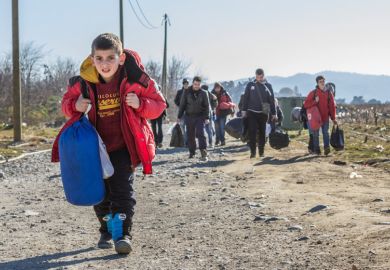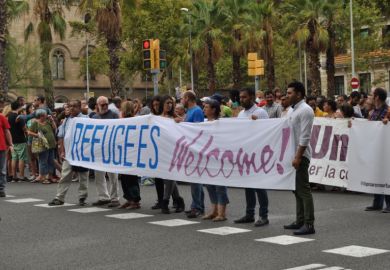A British academic expert in forced migration and “environmental displacement” has been appointed senior adviser to the United Nations High Commissioner for Refugees.
David Cantor is now a reader in international human rights law at the University of London’s School of Advanced Study, where he is also the director and founder of the Refugee Law Initiative, the UK’s only academic centre specifically operating in this field.
After 10 years as a refugee lawyer, he spent the period from 2005 to 2010 on a PhD. This, he said, looked at “whether people who are displaced from their homes have a right, under international law, to return”. It also included fieldwork in Colombia, where he “spent a year across seven different conflict zones”.
The country presented an interesting test case, in Dr Cantor’s view, because it “had adopted a law which specified a right of return for internally displaced people”, so he was able to examine what this meant on the ground for people “in very conflicted circumstances who often faced the hostile attention of at least four different armed actors”.
His fieldwork enabled Dr Cantor to “build up strong connections with displaced communities but also with the Colombian government, national, regional and municipal, and NGOs, with a view to going back and explaining what I’d found in a way that would help them better attend to the needs of those in sometimes quite insecure situations. Being there on the ground, you get an appreciation of what is likely to work and to be practical.”
A further project, funded by the Economic and Social Research Council (ESRC), gave Dr Cantor the chance to present his research to relevant policymakers and other interested parties.
As a result, he reported back to the ESRC, the Colombian congress and Ministry of Agriculture “drew on my project findings to make six positive modifications to a 2010 draft law for the reparation of victims and restitution of lands that was adopted by the Colombian congress in 2011.
“This is now the main framework for war reparations and IDP [internally displaced persons] protection in Colombia and a model for other countries in Latin America (and globally), as well as one of the bases on which the current peace process in Colombia is constructed.”
Equally significant were the results of another ESRC-funded project examining more broadly how “Latin American states use transnational structures and interventions to address new security and justice challenges resulting from forced migration flows”.
As he worked on this from 2012 to 2015, Dr Cantor became increasingly aware of the issue of “environmental displacement”. He was therefore “asked to draft what became, in November of last year, the first-ever international framework to deal with people who cross an international border due to climate change and natural disasters”. Its guidelines have already been adopted as a framework by 11 governments and will “probably form a model for other regions and perhaps even globally”.
It was such deeply policy-relevant research that has led to Dr Cantor’s part-time secondment to the UNHCR’s Americas Bureau.
Although unable to comment on the detail of the work, he is “now contributing to the drafting of UNHCR’s three-year strategy for the region, as well as other policy and legal instruments to guide UNHCR and governments in addressing protection challenges for refugees, asylum-seekers and IDPs in this region”.
Register to continue
Why register?
- Registration is free and only takes a moment
- Once registered, you can read 3 articles a month
- Sign up for our newsletter
Subscribe
Or subscribe for unlimited access to:
- Unlimited access to news, views, insights & reviews
- Digital editions
- Digital access to THE’s university and college rankings analysis
Already registered or a current subscriber?








